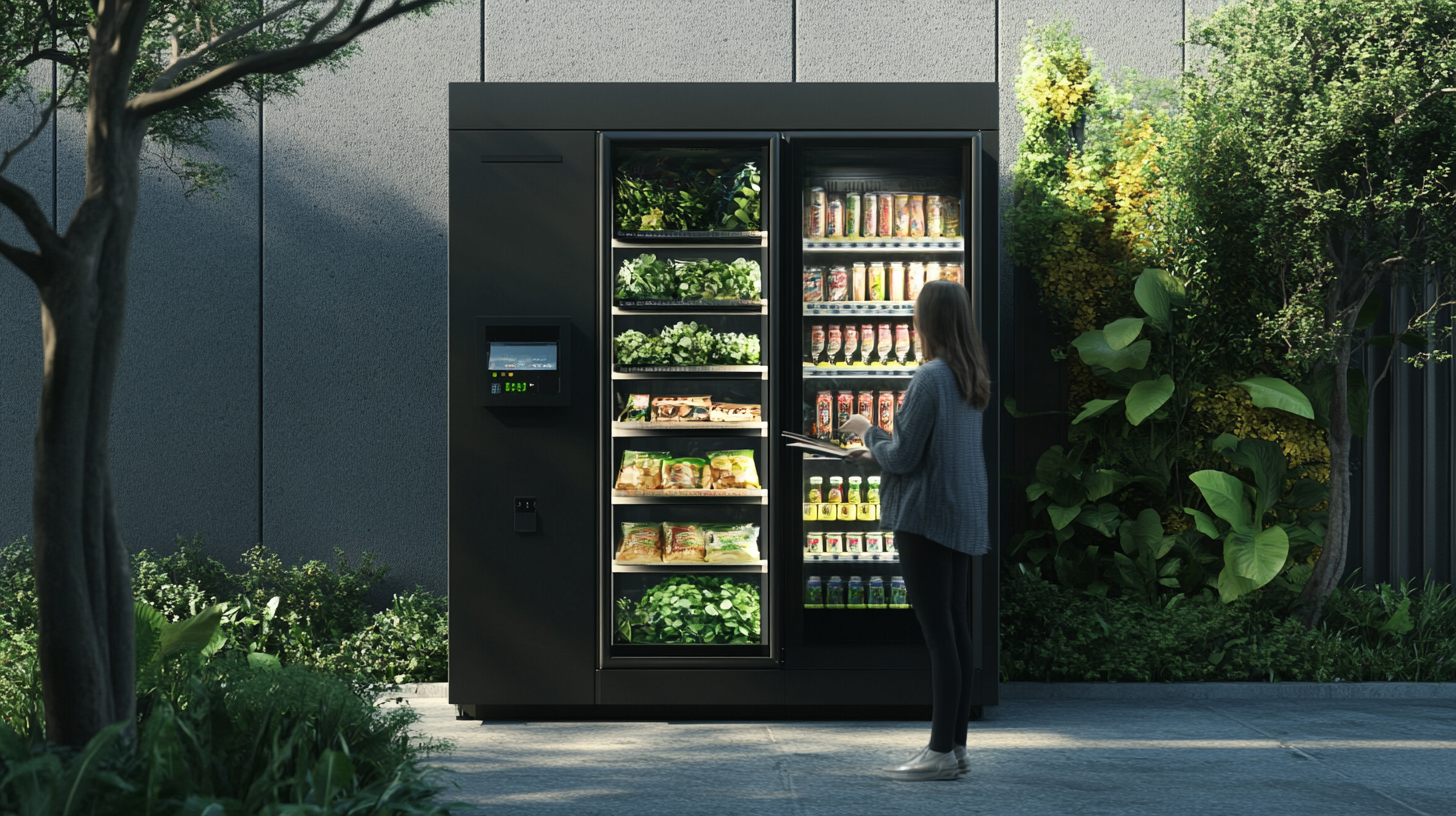Innovative Choices for Global Buyers Looking to Invest in Vending Machines
Investing in vending machines has emerged as a promising opportunity for global buyers seeking innovative revenue streams. With advancements in technology, the vending machine industry is evolving rapidly, offering a variety of machines that cater to ever-changing consumer demands. From traditional snack and beverage options to more modern selections like fresh food and healthy alternatives, the versatility of vending machines makes them an attractive investment. For those looking to buy vending machine, understanding the latest trends and market dynamics is essential to making informed decisions that can lead to substantial profitability.
In today's fast-paced world, convenience is key, and vending machines provide a seamless solution for consumers on the go. As more people seek quick and easy access to refreshments, the potential market for vending machines continues to expand. Moreover, the integration of smart technology, such as contactless payment systems and inventory tracking, enhances operational efficiency and customer experience. This blog will explore innovative choices for global buyers looking to invest in vending machines, emphasizing the advantages and strategic considerations of this unique business venture. Whether you are a seasoned entrepreneur or a first-time investor, understanding these aspects will help you navigate the exciting landscape of vending machine ownership.

Exploring the Evolution of Vending Machine Technologies for Investors
The evolution of vending machine technologies has transformed them from simple snack dispensers into versatile and innovative solutions for various consumer needs. Modern vending machines now incorporate advanced features like touch screens, cashless payment systems, and real-time inventory monitoring. This evolution reflects the increasing demand for convenience and efficiency in purchasing experiences. Investors in the vending machine industry now have the opportunity to leverage these technological advancements to enhance user engagement and satisfaction. Moreover, smart vending machines are at the forefront of this evolution, equipped with Internet of Things (IoT) capabilities that allow for remote management and data analytics. Investors can capitalize on the valuable insights gathered from consumer interactions, enabling them to optimize product offerings and location strategies. Additionally, the integration of healthy and trendy food options caters to the growing consumer preference for wellness, positioning investors to attract a broader demographic. Sustainability is also becoming a pivotal aspect of modern vending technology. Many manufacturers are developing eco-friendly machines that use energy-efficient systems and offer biodegradable packaging for products. This shift towards greener solutions not only benefits the environment but also resonates with socially conscious consumers. As a result, investors who prioritize sustainability can differentiate their vending solutions in a competitive market, tapping into the rising trend of environmentally responsible choices.

High-Profit Vending Machine Niches: What Global Buyers Should Consider
As the vending machine industry continues to evolve, global buyers are presented with a unique opportunity to invest in high-profit niches. According to a report by IBISWorld, the vending machine industry in the U.S. is expected to reach $25 billion in revenue by 2024, reflecting a growing trend in consumer preference for convenience and on-the-go solutions. This growth opens up a variety of profitable avenues for investors looking to capitalize on diverse vending machine options.
One of the most lucrative niches is the healthy snack segment, driven by a shift in consumer behavior towards healthier eating. A report from Grand View Research suggests that the global healthy snacks market size is anticipated to reach $32 billion by 2024. Vending machines that offer organic snacks, protein bars, and low-calorie options cater to the health-conscious consumer, presenting a profitable investment opportunity.
Another emerging trend is in cashless payment technology. With the rise of mobile wallets and contactless payments, vending machines that integrate these payment options are attracting a broader customer base. According to Statista, by 2025, the mobile payment market is projected to grow to over $12 trillion worldwide. Investing in vending machines equipped with advanced payment technology not only enhances user experience but also boosts sales potential, making it an attractive option for global buyers.
Collectively, focusing on health-oriented products and advanced payment systems positions global investors to thrive in the competitive vending machine market, leveraging current consumer trends to maximize their returns.

Sustainable Vending Machine Options: Eco-Friendly Investments for the Future
As the vending machine industry evolves, sustainability has become a crucial consideration for buyers looking to invest. Recent studies indicate that the global vending machine market is projected to reach $30 billion by 2027, with eco-friendly options gaining significant traction. In fact, reports from IBISWorld show that the demand for sustainable vending solutions is rising, driven not only by consumer expectations but also by regulatory pressures on businesses to adopt environmentally responsible practices.
Eco-friendly vending machines are designed with energy-efficient components and incorporate recyclable materials, which help reduce environmental impact. According to a survey conducted by the National Automatic Merchandising Association (NAMA), nearly 60% of consumers are more likely to purchase from vending machines that offer healthier and more sustainable options. This shift in consumer behavior presents a massive opportunity for global buyers to capitalize on the green movement by investing in machines that provide organic snacks and beverages, sustainably sourced products, and digital payment methods aimed at reducing waste.
Moreover, the introduction of smart technology in vending machines is revolutionizing the industry. Smart machines equipped with IoT capabilities can track product flow and monitor energy consumption, providing data that helps operators make informed decisions about inventory and energy usage. This innovative approach to vending aligns with the growing consumer preference for brands that prioritize sustainability. Thus, investing in sustainable vending machines is not just a trend but a strategic move to meet the demands of a market increasingly focused on eco-conscious choices.

The Role of Location: Strategic Placement for Maximum ROI in Vending Machines
The location of a vending machine is crucial for maximizing its return on investment (ROI). Strategic placement can significantly influence the volume of sales, making it essential for buyers to assess potential sites carefully. High foot traffic areas like shopping centers, schools, and airports are often ideal choices. These locations cater to consumers looking for convenience, whether it’s a quick snack during shopping or beverages while waiting for a flight. Conducting thorough market research to identify such hotspots can yield substantial financial rewards.
Beyond just foot traffic, the demographics of the surrounding area also play a key role in determining the success of a vending machine. For instance, locations near college campuses might benefit from machines offering energy drinks and snacks that appeal to students. Conversely, areas like corporate offices may see better sales for healthier options, such as salads and protein bars. Tailoring the product selection to fit the local audience’s preferences can enhance sales and bolster customer satisfaction.
Lastly, the visibility and accessibility of a vending machine cannot be underestimated. Machines placed in well-lit, open areas are more likely to attract attention and usage. Consideration should also be given to the placement of machines relative to competitors. While occupying the same area as other vending machines may lead to increased competition, it can also create a diverse offering for consumers, ultimately driving sales for all machines in the vicinity. By strategically thinking about location, global buyers can ensure their vending machine investments are well-positioned to yield the highest possible returns.
Navigating Regulations: Compliance Factors for International Vending Machine Buyers
Navigating the regulatory landscape is crucial for international buyers venturing into the vending machine market. As globalization continues to shape commerce, understanding local regulations and compliance factors is paramount to ensuring successful investments. Regulations can vary widely depending on the region, impacting everything from machine specifications to payment systems and even consumer safety standards.
The emergence of generative AI also introduces new dimensions to regulatory challenges. As technology influences vending machines, incorporating AI-driven features such as personalized customer interactions or inventory management, operators must remain vigilant about compliance with data protection and consumer privacy laws. These aspects require buyers to not only consider hardware specifications but also the implications of integrating advanced technologies into their operations.
Moreover, the manufacturing sector faces its own set of legal challenges in 2023, forcing buyers to assess the implications of supply chain disruptions and compliance with international trade regulations. Buyers should conduct thorough due diligence, ensuring that any investments align with local laws while anticipating potential legal hurdles that may arise in the rapidly evolving landscape of vending technology. By remaining informed and adaptable, global buyers can make strategic investments that comply with regulations and meet the demands of consumers.
